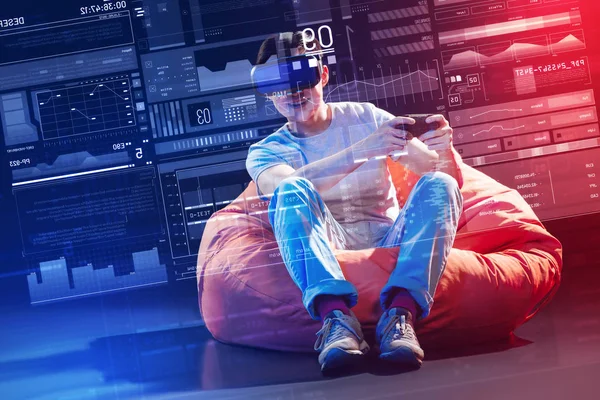Gaming has come a long way since the days of simple pixelated screens. The journey from Pong and Space Invaders to today’s breathtakingly realistic games is a testament to the rapid growth of technology and creativity in the industry. Modern video games are no longer just about playing; they’re about experiencing. Today, players can explore expansive open worlds, interact with lifelike characters, and even craft their unique stories.
The advent of virtual reality (VR) and augmented reality (AR) has revolutionized how players interact with games. VR headsets like the Oculus Quest or PlayStation VR immerse players entirely into digital environments, while AR blends real-world settings with interactive elements, as seen in mobile games like Pokémon GO.
Moreover, the demand for highly personalized and immersive gameplay experiences continues to grow. Gamers expect not just entertainment but emotional engagement and meaningful connections with the worlds they explore. This expectation drives studios to innovate further, integrating cutting-edge technologies to make games more captivating than ever.
From humble beginnings to today’s sophisticated platforms, gaming’s evolution has proven that it’s more than just a pastime—it’s an art form that continues to push boundaries.
The Rise of Blockchain in Gaming
Blockchain technology is reshaping industries across the globe, and gaming is no exception. Its integration into gaming is creating new ways for players to interact with their favorite games while also introducing innovative revenue models for developers. At the core of this transformation is the concept of ownership. Blockchain enables players to truly own in-game assets—like characters, skins, or weapons—through tokenization. Unlike traditional games, where such items exist solely within the game environment, blockchain-based games allow these assets to be traded or sold on decentralized platforms.
One standout example is the rise of play-to-earn (P2E) games, where players are rewarded with cryptocurrencies or NFTs (non-fungible tokens) for their achievements. These games provide not just entertainment but also financial incentives, bridging the gap between gaming and real-world value.
Additionally, blockchain ensures transparency and security. It allows developers to create tamper-proof systems for in-game transactions, eradicating fraud and fostering trust among players. This is especially significant in multiplayer games with thriving marketplaces. A growing number of gaming studios are partnering with experts like an NFT gaming company to integrate these technologies seamlessly. Working with an NFT game development company allows developers to focus on gameplay innovation while leveraging blockchain’s potential to redefine gaming economies.
Blockchain is not just a buzzword—it’s a game-changer for developers and players alike, offering opportunities for creative and financial growth.
The Role of AI and Machine Learning in Game Development
Artificial intelligence (AI) and machine learning are enhancing nearly every aspect of game development. From crafting realistic non-player characters (NPCs) to creating adaptive difficulty levels, AI is ensuring games remain engaging and immersive for all players.
One key application of AI is procedural content generation. Using algorithms, developers can create vast game worlds with minimal manual input. This approach has been used in games like Minecraft and No Man’s Sky, where players explore dynamic, ever-changing environments. AI also powers smarter NPCs, giving them lifelike behaviors and responses. In stealth games, for instance, NPCs can adapt their tactics based on player actions, making gameplay feel fresh and unpredictable.
Machine learning goes a step further by analyzing player behavior to personalize experiences. For example, AI can identify a player’s skill level and adjust game difficulty accordingly, ensuring that casual players and hardcore gamers alike feel challenged yet not frustrated.
Additionally, AI is optimizing game development workflows. Tasks like debugging, testing, and even voice synthesis are becoming faster and more efficient thanks to machine learning tools. Developers can use this saved time to focus on creativity and storytelling.
AI and machine learning are not just making games smarter—they’re making them more fun, accessible, and tailored to individual players.
Expanding Possibilities with Cross-Platform Play
Cross-platform gaming is no longer a luxury; it’s becoming a necessity in today’s interconnected world. Players now expect the ability to enjoy their favorite games with friends, regardless of whether they’re using a PC, console, or mobile device.
Developers are responding by creating games that allow seamless play across different platforms. Popular titles like Fortnite, Minecraft, and Call of Duty: Warzone have embraced this trend, giving players the freedom to switch between devices without losing progress or functionality.
Cross-platform compatibility enhances community engagement. It brings diverse groups of players together, breaking down barriers and fostering a more inclusive gaming environment. However, it also presents challenges, particularly in maintaining balance and fairness. Developers must ensure that players on different devices—say, a high-powered PC versus a smartphone—have equitable gaming experiences.
This trend isn’t just a boon for players. It also benefits developers by expanding the reach of their games and increasing player retention. As gaming continues to grow, cross-platform play will likely remain a key factor in its success.
The Future of Interactive Entertainment
The gaming industry is evolving faster than ever, blending creativity with cutting-edge technology to shape the future of interactive entertainment. From the rise of blockchain and AI to the demand for cross-platform play, the trends shaping the industry today are setting the stage for even greater innovations tomorrow.
One of the most promising developments is the growing focus on player ownership and engagement. Technologies like NFTs are empowering players to become active participants in gaming economies, not just consumers. Collaborations with specialized teams, such as an NFT gaming company, are helping developers explore these possibilities further. Studios that embrace these changes are likely to remain competitive in an ever-evolving landscape.
At its core, the future of gaming is about creating experiences that are immersive, inclusive, and meaningful. Whether through realistic AI-driven worlds or blockchain-powered economies, the industry is set to push the boundaries of what interactive entertainment can achieve. For developers and players alike, the possibilities are endless—and the next chapter of gaming promises to be the most exciting yet.





